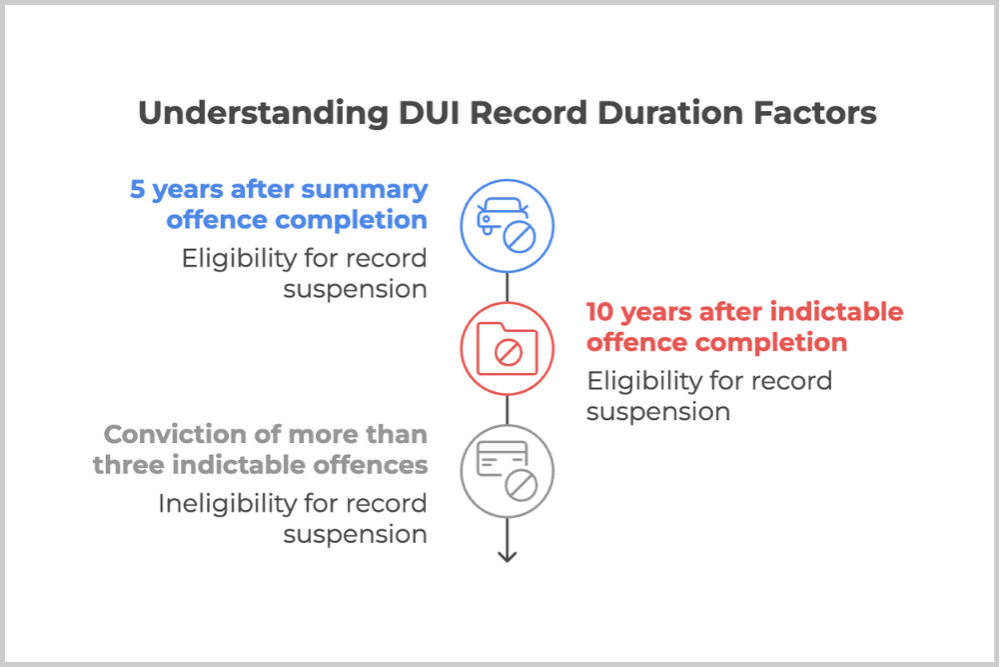How Long Does a DUI Stay On Your Record Ontario
Last Updated: August 8, 2024
If you are convicted of a Criminal DUI in Ontario, this DUI can potentially stay on your record forever unless you are pardoned or apply for a record suspension.
Applying for a suspension can only be done for 5 years (if prosecuted summarily) or 10 years (if prosecuted by indictment) after your sentence, including imprisonment, probation and the paying of fines, is completed.
With probation being, on average, a year-long, this means a minimum of 6 years with a record, with the maximum time being forever if one does not apply for a suspension.
A DUI will also be on your driving record in Ontario.
If your first DUI conviction is accompanied by a licence suspension, the DUI will be on your driving record for 6 years. If there is no licence suspension accompanying your first conviction, the DUI will only be on your record for 3 years.
For subsequent DUI convictions, the DUIs will remain on your driving record forever.
Factors Influencing the Duration

There are several factors that influence the duration of a DUI in one’s record. These factors influence when one can apply for a record suspension.
The first factor is the severity of the offence.
DUIs can be prosecuted summarily or by indictment. Summary offences are less serious, and a record suspension can be applied for 5 years after your term of imprisonment or probation is completed. In contrast, indictable offences are more serious, and one must wait 10 years before applying for a suspension.
This waiting period does not involve driving suspensions, meaning this is not a term of probation that must be completed before the 5 or 10 year waiting period begins.
The second factor is if you are a repeat offender or not.
If you have been convicted of more than three offences prosecuted by indictment with a sentence of two years or more, you are no longer eligible for a record suspension, meaning your record duration would be forever.

Removal and Pardons
You can apply for a record suspension 5 years after finishing probation or imprisonment for a summary offence or 10 years after an indictable offence. The fee for a record suspension is $50.
If you have been convicted of more than three offences prosecuted by indictment with a sentence of two years or more, you are no longer eligible for a record suspension.
To apply for a record suspension, you must obtain your criminal record from the RCMP and obtain your court information using the court information form.
Finally, you must get your local police records using the Local Police Records Check Form. If you are a member of the military, you must also get your Military Conduct Sheet.
All these forms and sheets are provided on the Government of Canada website. Along with these forms, you must provide a photocopy of your identification documents.
After providing this information, one must complete the Record Suspension Application Form and the. You also may complete the Measurable Benefit/Sustained Rehabilitation Form. This form allows you to describe how receiving a record suspension would provide you with a measurable benefit and sustain your rehabilitation into society as a law-abiding citizen.
Applications seeking a record suspension for first offences tried summarily are processed within 6 months of application acceptance, while first offences by indictment are processed within 12 months.
If a record suspension is granted, the DUI will be removed from your Criminal Record.
If you are found guilty of a DUI under the Criminal Code, there is a mandatory minimum fine of $1000.00 for a first offence with a maximum charge of 10 years imprisonment. For second and subsequent criminal offences, imprisonment is mandatory.
On the Provincial level, the Highway Traffic Act outlined punishments in addition to punishments under the Criminal Code. These punishments include a year driving suspension for first-time offenders and a lifetime suspension for a third offence.
In addition to suspensions, drivers must complete an educational or treatment program to be reinstated. These educational programs last around 10 months. Educational programs can allow someone to drive again during their period of suspension if they get an ignition interlock device (commonly known as a blow box) installed in their vehicle. There are also fees for reinstating a licence ($275), fines (ranging from $250.00 to $550.00), vehicle impoundment, and the potential for jail time.

Insurance Implications
DUI charges in Ontario often, if not always, result in an increase in insurance premiums.
These increases can be anywhere from 50% to 100% more than what you were paying previously. Your insurance company may also deny to insure you after your DUI.
As you would be considered a high-risk driver after conviction, you would be forced to seek insurance at a higher price. You can expect these higher prices to last at least three years.
Tips for avoiding high premiums involve exploring your insurance options or using a less expensive vehicle with lower insurance rates.
Impact on Employment and Travel
A criminal record can impact employment and travel.
Some jobs require criminal record checks or a vulnerable sector check. If this is the case, your DUI will be visible until you seek a record suspension, which could hinder your ability to gain employment.
If applying for a professional licence, a DUI may also make you ineligible for receiving one.
A DUI can impact travel as well, especially to the US.
The US and Canada share an information hub called CPIC, meaning the Canadian Police Information Centre. This allows US border officers to access Canadian Citizen’s criminal records.
Your DUI would thus be visible to the border officers, and they may choose to deny your entry to the country based on this.
Legal and Administrative Steps to Mitigate Impact
A DUI charge is serious and may leave you feeling lost or hopeless. There are some important steps to take to mitigate the impact of a DUI on your life.
- Legal Advice: A DUI lawyer has experience in DUI convictions and consequences. Reaching out to them for advice in dealing with your charge and with improving your chances of a record suspension is an important step in moving past your charge.
- Rehabilitation Programs: Ontarians have access to a variety of inpatient and outpatient treatments for people with addiction issues. If you have an alcohol addiction, you may seek these programs out, both to improve yourself and to show your commitment to taking responsibility for your actions.
- Driving Courses: You may wish to explore options for driving courses in your area. These courses can reduce insurance premiums in addition to demonstrating your responsibility and commitment to becoming a better driver.
Conclusion
In conclusion, a DUI will stay on your record forever unless you apply for a record suspension. Your wait period and eligibility for a record suspension will apply on the severity of the offence and if you are a repeat offender. The fee for a record suspension application is $50, and the application can be completed online. There is a 6-12 month waiting period after the application is submitted.
A DUI can impact insurance, employment, travel and more. As such seeking advice from a criminal lawyer in terms of mitigating the impact of a DUI is an important step for securing your future.
Get A Free Consultation
"*" indicates required fields



